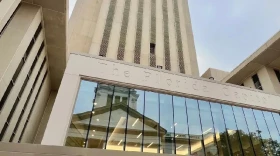If Florida’s iconic strawberry industry is going to survive climate change brought on by carbon and other greenhouse gas emissions, growers must be willing to embrace major changes to how nearly everything is done. Quickly.
That’s according to University of Florida agricultural researchers working with the Environmental Defense Fund, who have issued a new report detailing the grave threat global warming is posing to the state’s $400 million strawberry industry.

Tampa Bay-based strawberry growers must move north by 2050 – little more than 25 years from now - to chase the proper growing zone due to global warming.
If they don't relocate, growers can anticipate a 17%t decline in early yields, which translates into a monetary loss of 10% per acre, the report says.
Wholesalers who purchase the strawberries for the market will have to adapt to new realities as will those who deliver the fruit to store shelves.
Rising temperatures, lack of water, unpredictable weather events, and changes in sunlight are key factors already in place to affect crop yields, farming practices, and the availability of strawberries.
Since strawberries are sensitive to changes in temperature and rainfall, the researchers say it is crucial to implement the changes that can reduce the impact on agricultural production.
In Hillsborough County, which is home to the City of Tampa and where most of the state’s strawberries are grown, growers can anticipate an 11% decline in the overall crop by mid-century if they don’t relocate farther north in the state.

“Agriculture has been hard hit by extreme weather in Florida especially, sustaining over one billion in losses from Hurricane Ian in 2022 alone,” said Dawn Shirreffs, the Environmental Defense Fund’s Florida director. “Mid-century climate change will have a big impact on farmers who are growing these delicious red fruits. “

Shirreffs said greenhouse gas and carbon emissions have become endemic in the mid-Florida strawberry-growing industry.
The only way to keep strawberries a viable crop will be to dictate what the University of Florida report proposes as “adaption strategies,” which include shade over crops, diversification of strawberries fields, changing when to plant and pick strawberries, and developing new types of strawberries that can withstand the upheaval.
At stake is the productivity of strawberry farms, often family-owned, a stable supply of the fruit, and the health of the economies the counties that depend on the crop.
And Shirreffs said the changes are what it’s going to take for some other types of Florida farmers, too, to survive the challenges posed by climate change.
“None of it is easy,” she said.
Environmental reporting for WGCU is funded in part by VoLo Foundation, a non-profit with a mission to accelerate change and global impact by supporting science-based climate solutions, enhancing education, and improving health.
Sign up for WGCU's monthly environmental newsletter, the Green Flash, today.
WGCU is your trusted source for news and information in Southwest Florida. We are a nonprofit public service, and your support is more critical than ever. Keep public media strong and donate now. Thank you.








